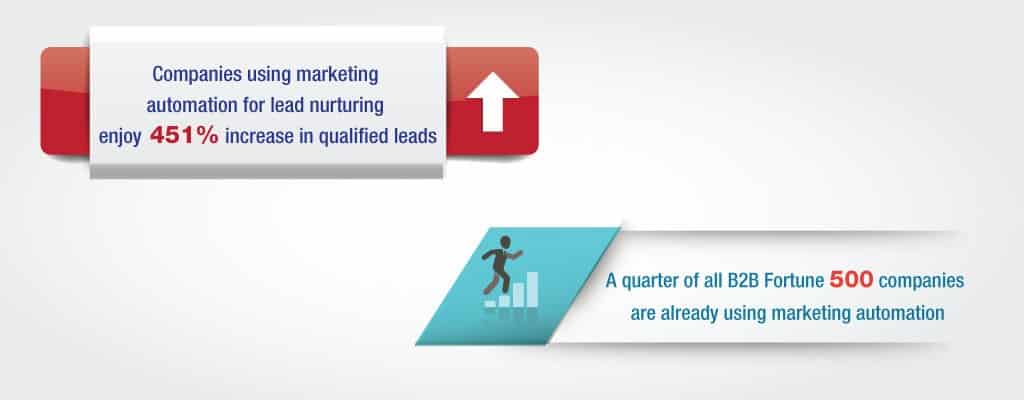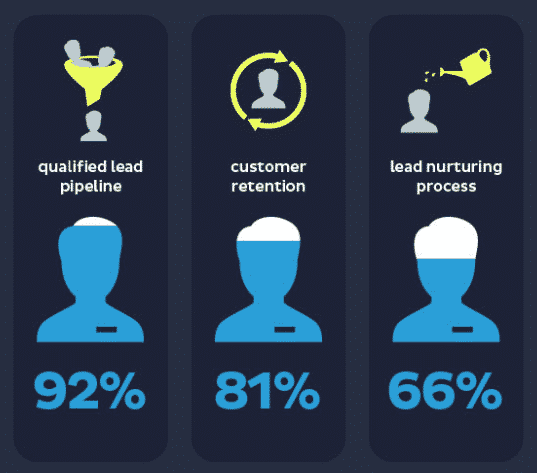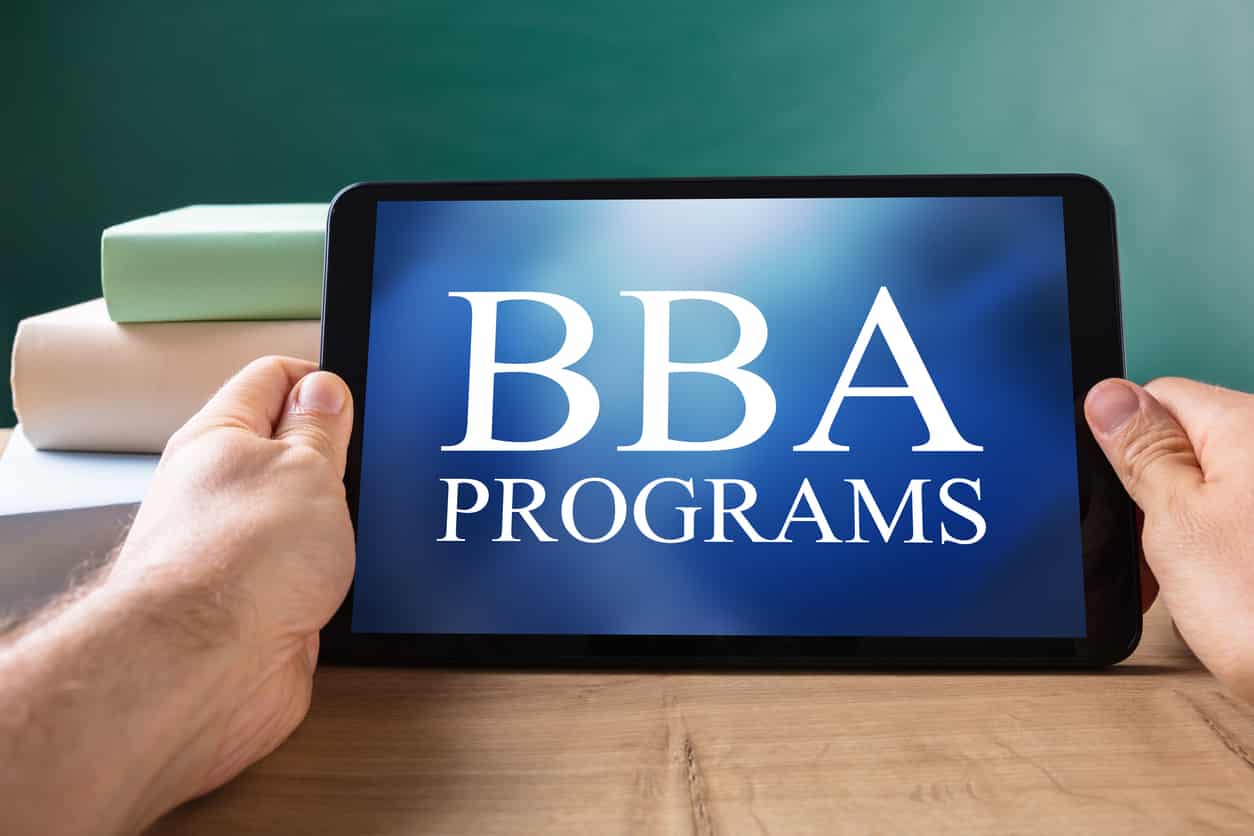- Marketing automation can boost sales productivity
- Marketing automation for nurturing leads
- Marketing automation for lead generation
- Qualified leads for lead scoring
- Automated Email and messaging
- Tracking performance
- Personalization
- Align CRM with marketing automation
- Conversational marketing
- Multichannel tracking
Marketing automation can help provide value-driven experiences for customers and aid to increase your business’ revenue. Marketing automation can help optimize processes in the sales funnel by nurturing leads and increasing sales efficiency in various ways.
Marketing automation can boost sales productivity
Marketing automation can automate and create workflows for tedious and manual but necessary tasks bringing speed and agility, thus improving the sales process. Automated workflows remove tedious manual activities that do not aid in increasing sales, enabling employees to spend more time on priority tasks, thus increasing efficiency. According to research conducted previously, marketing automation drives more than a 14.5% increase in sales productivity and a 12.2% reduction in marketing overhead. 80% of marketing automation users saw an increase in the number of leads using marketing automation software, and 77% saw an increase in conversions.
Lead management has become increasingly complex, and marketing automation helps in lead scoring, tracking, and other lead nurturing efforts.

Marketing automation for nurturing leads
Lead conversions and the time spent on unsuccessful leads impact the overall sales process of the company. Most leads require a lot of nurturing before they decide to buy products or services. It is estimated that almost 96% of users come to websites unprepared to buy. The customer experience has also changed significantly and has become more challenging than ever.
Marketing automation aids in lead segmentation and helps design personalized approaches to nurturing them. Automation with 24/7 availability and email sequences (drip campaigns) can help keep leads engaged, thus enhancing the rate of conversions. Automation also helps define the target audience and enhances user-centricity, the key to all successful businesses.
Marketing automation for lead generation
Marketing automation helps generate leads and unifies the process for businesses by incorporating mechanisms that help convert website visitors, nurture them, etc. Marketing automation is all about generating leads and nurturing them to enhance conversions. Automation focuses on transferring leads from the top of the marketing funnel to the bottom to become sales-ready leads. Prospects are scored depending on their actions, and they receive personalized content, allowing them to be nurtured from first contact to the actual sale.

Qualified leads for lead scoring
Taking essential lead generation one step further, marketing automation tools help lead generation channels and lead scoring. With lead scoring, generated leads are ready to be incorporated into the sales funnel, lessening the time lost on unqualified leads. Marketing automation keeps track of leads and assigns numbers to them for actions that the leads take like visiting the websites, taking surveys, subscribing to mailing lists, etc. Once they obtain a cetin lead score, they can then be taken up by the sales team, helping them close more deals.
Automated Email and messaging
With the proper use of automation tools, businesses can keep their leads busy and engaged. Automated messages and emails can be triggered based on lead actions. On average, in 2021, 51% of companies are using automation, among which 49% believed that it was worth the price. Triggered emails also generate over 75% of email revenue in comparison to non-personalized campaigns, and automated emails have a 152% higher click-through rate.
Tracking performance
Assessing the performance and ROI of sales campaigns is important to understand and compare sales processes and improve on strategies currently in place. Sales teams can use marketing automation to track campaigns by the marketing team. Understanding what performs well and brings back a higher ROI will help the sales team effectively assess and analyze their processes. Sales and marketing collaboration is of immense benefit, enabling both of these to improve their operations.
Personalization
In a user-centric era, personalization and relevant content and targeting hold the key to unlocking many doors for businesses. All content and messages that are sent out to a particular lead need to be relevant, useful, and tailor-made. Marketing automation can track consumer behavior and understand what makes them behave in a certain way and what their needs are. Understanding this helps businesses target their leads effectively with behavioral targeting, personalized advertising, and so on, thus increasing conversion.
Align CRM with marketing automation
Businesses with a tight-knit marketing and sales team are bound to perform better. According to a study, these businesses had a 36% higher retention rate and 38% higher conversion rates. Linking CRM to marketing automation increases understanding and transparency between the teams whilst also allowing them to share key insights enriching the sales experience. Account-based marketing refers to strategies that allow the two teams to collaborate to create personalized buying experiences for a mutually-identified set of high-value accounts, striving for more profitable leads and optimizing ROI.
CRM linking allows sales to see where the leads are coming from, enhancing their ability to sell, and buyers will have an informed experience.
Conversational marketing
AI and automated conversations with chatbots can be leveraged to handle the first contact sales journey without the need for a person to be present. This has become beneficial especially with the onset of the pandemic and businesses going online. The sales team need not spend time answering common questions with bots aiding customers in their initial stages, which helps maintain empathy before a human may be assigned to them.
Multichannel tracking
Marketing automation enhances the chances of conversion through multiple channels targeted at the same user as they navigate through different mediums. According to research, multichannel tracking has aided in a 15-35% revenue lift, 46% increase in app retention, and a 49% increase in conversion.
If you are looking to upskill in marketing, check out Specialization in Marketing Management now.









